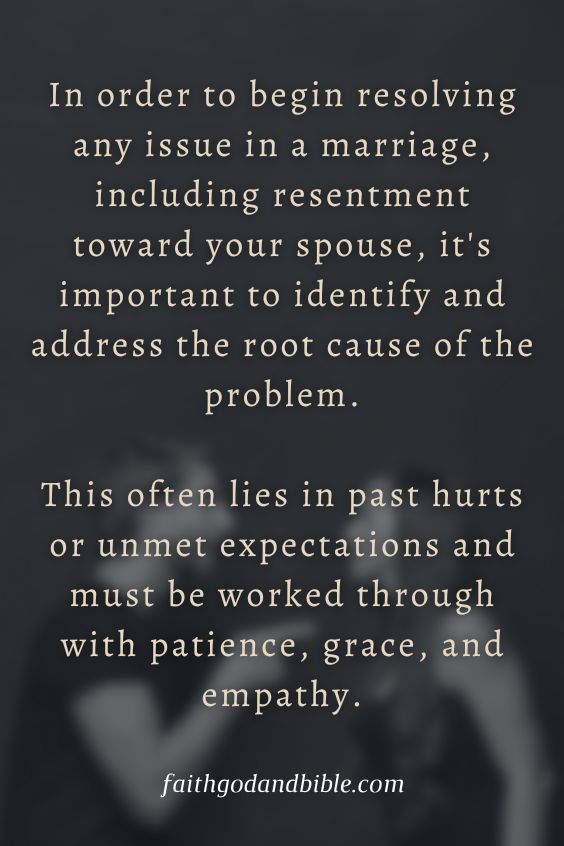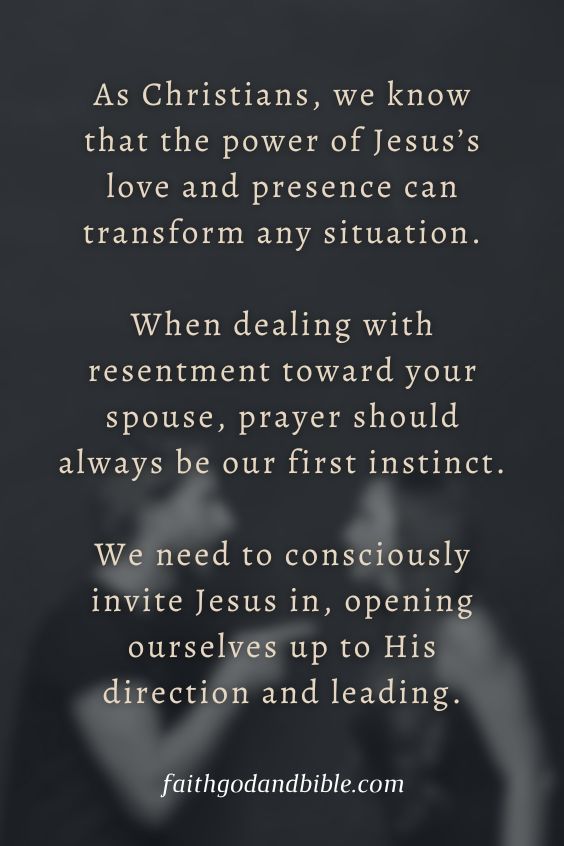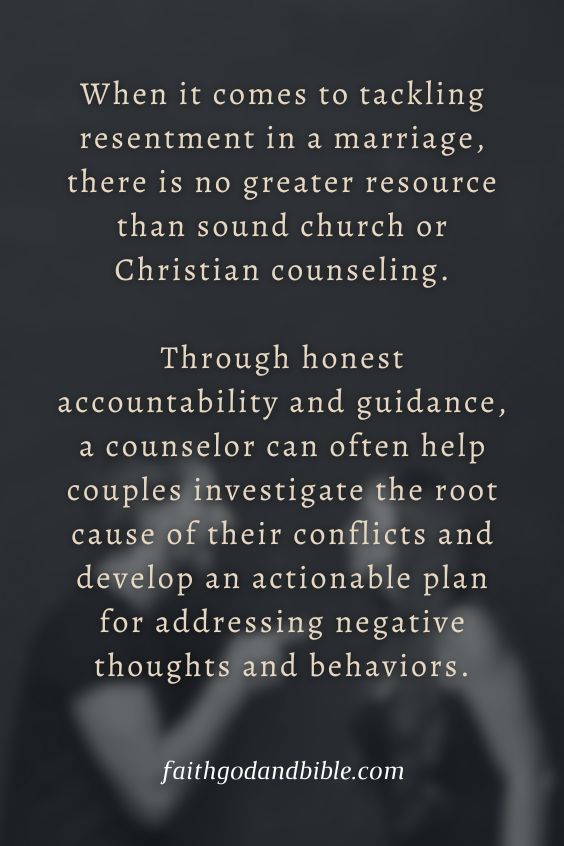Relationships can become strained due to the build-up of resentment between spouses, and it is easy for negative thoughts and actions to follow if resentment is not properly addressed. Fortunately, couples can overcome resentment biblically by following the principles outlined in Scripture.
As a Christian marriage counselor with over 25 years of experience in helping couples deal with marital issues, I have seen firsthand how these biblical recommendations, when fully embraced, help preserve relationships. Resentment causes animosity, but God’s Word urges us to show empathy instead. By focusing on understanding our spouse’s feelings, we can make strides toward forgiving one another and bringing healing into a marriage relationship.
Here are some key Bible-led strategies to help you start dealing with your resentments today so that you may walk closer together as husband and wife.

How Do I Deal With Resentment Towards My Spouse Biblically?
What Is Resentment, and Why Does It Happen in Marriage?

How Do I Deal With Resentment Towards My Spouse Biblically?
Resentment is a feeling of bitterness, indignation, or anger toward someone whose actions have caused pain. In a marriage context, feelings of resentment can arise when one partner feels that their expectations for the relationship are not being met and unresolved conflicts are leading to hurt feelings, often amplified by negative spirals in communication.
Resentment can also stem from unforgiveness within the relationship; when past wrongs remain unexpressed or unacknowledged, that creates an unhealthy atmosphere where resentment festers. The Bible explains how God desires us to forgive each other as He has forgiven us (Colossians 3:13). So, reconciling with our spouse and choosing love over revenge brings harmony into our lives and strengthens our spiritual journey.
Unresolved resentments can manifest themselves in many ways, including blaming behavior, passive aggression, sarcasm, or defensiveness—all of which spell trouble for any marriage! We must center ourselves on Scripture if we want to deal with this issue constructively, and we should seek guidance from God’s Word before responding (Proverbs 16:32). Not only will it help to restore peace between you and your spouse, but it will draw you closer together spiritually and closer still to God Himself, Who sets all things right (2 Corinthians 5:18-19).
Biblical Principles for Dealing with Resentment Toward Your Spouse

How Do I Deal With Resentment Towards My Spouse Biblically?
Understanding and following God’s will is essential for a successful Christian marriage. To combat resentment toward your spouse, focus on important biblical principles such as investigating and addressing the root cause of issues, confessing and repenting from negative thoughts and actions, and inviting Jesus into the conversation.
Investigate and address the root cause
In order to begin resolving any issue in a marriage, including resentment toward your spouse, it’s important to identify and address the root cause of the problem. This often lies in past hurts or unmet expectations and must be worked through with patience, grace, and empathy.

How Do I Deal With Resentment Towards My Spouse Biblically?
To do this from a biblical standpoint involves allowing Jesus into the process. With faith and trust in Him, all things are possible (Matthew 19:26). Pray that He will guide you both as you seek understanding and forgiveness for previous hurts.
It is also important to understand how each person’s background has shaped their reactions, beliefs, values, or desires. Recognizing our own perspectives can help us empathize with others more effectively (Philippians 2:3-4).
Confess and repent of any negative thoughts and actions
Confessing and repenting of negative thoughts and actions is a vital part of the reconciliation process in every Christian marriage. As Philippians 4:8 teaches, whatever things are true, whatever things are noble, whatever things are just, whatever things are pure, we should meditate on these things.

How Do I Deal With Resentment Towards My Spouse Biblically?
Therefore, to reconcile a strained relationship we must first be honest about our feelings and recognize when our thoughts have become overly negative or unhelpful. Additionally, repentance requires us to turn away from those wrongdoings and actively pursue more positive emotions—namely, love for God with all that we have (Mark 12:30) and love for our spouse as for ourselves (Matthew 22:39).
These biblical principles provide an invaluable foundation for healing any resentment toward your spouse by taking personal responsibility for your own motivations and behavior while turning to Jesus in prayer.
Invite Jesus into the situation
As Christians, we know that the power of Jesus’s love and presence can transform any situation. When dealing with resentment toward your spouse, prayer should always be our first instinct. We need to consciously invite Jesus in, opening ourselves up to His direction and leading. As we surrender to God in humility and honesty, He can reveal any areas of hidden bitterness or false expectations that lead us astray from forgiving freely from the heart (Colossians 3:13).

How Do I Deal With Resentment Towards My Spouse Biblically?
You might even pray out loud together as a couple to understand each other’s feelings better and communicate more openly so that resolutions are possible (James 1:19-20). When these conversations may not be fruitful enough on their own, it is important to also seek professional counseling or guidance from fellow church members who can provide wise advice based on Scripture as they navigate this process collectively (Proverbs 11:14).
There have been countless examples of how couples have seen God at work when they are prioritizing relationship restoration through biblically-rooted steps such as repentance for wrongdoing on both sides (Acts 3:19), forgiveness, and seeking frequent prayer together over the issue (Ephesians 6:18).
Practical Strategies for Overcoming Resentment in Your Marriage
Taking practical steps to transform anger and resentment toward your spouse in light of God’s word can help foster a healthier outlook for both parties.
Pray earnestly for your spouse
Prayer has an amazing power that can be used to deal with resentment in marriage. It is a powerful tool for showing grace toward one’s spouse and overcoming anger issues, enabling you to surrender the situation completely to God and choose forgiveness and love over anger.
Jesus encouraged us multiple times throughout Scripture to pray even when it feels difficult or overwhelming. When spouses pray earnestly for each other, it places them in agreement with God’s will for a better life and relationship together, as described in 1 Peter 3:7: “Live together in understanding; Moreover, as the adherents of Christ forgive each other from a deep heart.” Praying builds a trust between spouses that allows unhelpful patterns to dissolve, including bitterness toward one another’s weaknesses.
In Colossians 4:2, we are asked to “Continue earnestly in prayer, being vigilant in it with thanksgiving.” Therefore, through prayer, couples can demonstrate faithfulness toward their partner by allowing God into the most vulnerable parts of their relationship.
Continue to lead biblically, regardless of their response
Leading biblically in marriage regardless of your spouse’s response is a critical part of overcoming resentment. This type of leadership requires faith and courage to abide by the foundational Christian principles for marriage—love your neighbor as yourself (Matthew 22:39), provide comfort and support during difficult times (1 Thessalonians 5:14), honor God through your actions and words (Ephesians 4:29).
Practically speaking, this means modeling sacrificial love, repeatedly forgiving minor offenses, and investing time in understanding what a partner needs emotionally or physically. It also includes not allowing prideful attitudes and provocative language to cloud judgment but rather promoting humility in every situation despite contradicting responses from the other person.
Continuously looking for ways to serve without expecting something in return demonstrates Christlike love. Furthermore, maintaining biblical perspectives on topics such as finances, sex outside of marriage, and boundaries with extended family members provides an opportunity to shed light on potentially contentious issues without anger or accusation. This is done with a calm assurance that these decisions align with Scripture.
Seek guidance from a sound church or Christian counseling
When it comes to tackling resentment in a marriage, there is no greater resource than sound church or Christian counseling. Through honest accountability and guidance, a counselor can often help couples investigate the root cause of their conflicts and develop an actionable plan for addressing negative thoughts and behaviors.

How Do I Deal With Resentment Towards My Spouse Biblically?
By working with somebody well-versed in biblical principles of reconciliation, spouses can better align their commitment to God’s truth within their relationship. And by fully surrendering the matter to Jesus through prayerful partnership, they’ll be able to join together along the journey toward restoration.
Seeking such formative guidance opens up opportunities for greater understanding between partners through biblically-rooted communication that honors each individual’s experience while planting a foundation of love grounded in faith.
Surrender the matter to God and choose forgiveness and love
This is one of the most powerful biblical principles for overcoming resentment and bitterness toward your spouse. When we hold out against forgiving our spouses, not only does it continue to pit us against each other, but it blocks the grace of God in our lives, preventing us from fully understanding and experiencing His love.
The finest thing a couple can do when they’re struggling with resentment or hurt feelings is to prayerfully surrender their circumstances together to the Lord in faith. This doesn’t mean you forget what your spouse did wrong. Choosing forgiveness as an act of obedience toward God instead of revenge or reticence encourages healing within your marriage relationship.
In Ephesians 4:32, Paul writes, “Be kind to one another, tenderhearted and forgiving one another even as God in Christ forgave you.” We are called on not just to forgive once but to continually choose a spirit of loving-kindness and mutual forbearance—something that’s impossible without divine assistance! By relying on Jesus’ redeeming grace to empower them with unconditional love for their spouses, both husband and wife become vessels through which forgiveness can flow freely between them. This allows hurts caused by sin – whether past sins or current grievances – to be wiped away readily and completely from the marriage bond once more.
Conclusion
Embracing the biblical principles of forgiveness and love, confessing and repenting of any negative thoughts and actions, filling your heart and mind with God’s word, trusting in the Lord to meet all your needs, praying earnestly for your spouse, seeking guidance from a sound church or Christian counseling, continuing to lead biblically regardless of the other’s response—all these things are key ingredients for overcoming resentment.
When we believe in Jesus Christ as our Savior and aim to obey Him in all aspects of our lives, including marriage, it is possible to address feelings of anger and bitterness toward one’s spouse with patience and perseverance.
Ultimately, each individual must respond by putting his/her faith into action through repentance and practical steps that will help restore a relationship marred by resentment.
FAQs
1. What does the Bible say about dealing with marital resentment?
The Bible encourages communication in marriage and paying attention to godly principles as a way of resolving differences between spouses. Gen. 2:24 states, “This is why a man leaves his father and mother and is joined to his wife, and the two are united into one” (NLT).
2. How can I avoid resentment toward my spouse?
Rather than asking yourself How could they do this to me? try considering ways you can honor your spouse instead, remembering that we all make mistakes that require forgiveness from time to time. Develop habits such as praying for them regularly or finding meaningful ways they serve or bless you even if just by being themselves!
3. Is there ever a time when divorce is permissible according to Scripture?
Yes, biblical guidelines permit divorce in cases of adultery or desertion, although it should be noted that Jesus discouraged people from divorcing their partners except where these situations were applicable (Matthew 19:9).
4. Who should I turn to if I’m struggling with feelings of resentment toward my spouse?
Practicing confession before God has been shown to be therapeutic for believers who struggle with strong negative emotions such as bitterness or resentment toward their marriage partner (James 5:16). Asking trusted family members or friends to provide accountability can also help work through resentment while keeping our relationships healthy and close-knit.
Leave a comment